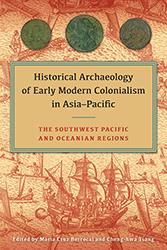Historical Archaeology of Early Modern Colonialism in Asia-Pacific
The Southwest Pacific and Oceanian Regions
Edited by María Cruz Berrocal and Cheng-hwa Tsang
Hardcover: $95.00
“The essential source for scholarly reassessment of the Asia-Pacific region’s diverse and significant archaeology and history.”—James P. Delgado, coauthor of The Maritime Landscape of the Isthmus of Panamá
“Underpins a nuanced picture of Asia-Pacific that shows how the activities of the Chinese and Japanese in East Asia, the spread of Islam from South Asia, and the efforts of the Iberians and especially the Spanish from southern Europe ushered in a world of complex interaction and rapid and often profound change in local, regional, and wider cultural patterns.”—Ian Lilley, editor of Archaeology of Oceania: Australia and the Pacific Islands
The history of Asia-Pacific since the sixteenth century has traditionally been told with Europe as the main player ushering in a globalized, capitalist world, but the contributors to this volume and its companion volume suggest that Europeans merely appropriated existing systems in the area for their own benefit. The essays help decentralize that global history and assemble a picture of the region before and after European involvement in order to develop a more holistic understanding of colonial processes.
In this volume of Historical Archaeology of Early Modern Colonialism in Asia-Pacific, case studies from Alofi, Vanuatu, the Marianas, Hawai‘i, Guam, and Taiwan compare the development of colonialism across different islands. Contributors discuss human settlement before the arrival of Dutch, French, British, and Spanish explorers, tracing major exchange routes that were active as early as the tenth century. Pulling from oral tradition as well as archaeological and written records, they highlight rarely examined sixteenth- and seventeenth-century encounters between indigenous populations and Europeans and draw attention to how cross-cultural interaction impacted the local peoples of Oceania.
Packed with archaeological and historical evidence from both land and underwater sites, impressive in geographical scope, and featuring perspectives of scholars from many different countries and traditions, this volume and its companion illuminate the often misunderstood nature of early colonialism in Asia-Pacific.
María Cruz Berrocal, a research fellow at the Zukunftskolleg, University of Konstanz, is coeditor of Archaeologies of Early Modern Spanish Colonialism. Cheng-hwa Tsang, professor of anthropology at National Tsing-Hua University and corresponding research fellow at Academia Sinica, is the author of Archaeology of the P’eng-Hu Islands.
Contributors: Marcelin Abong | Dr. James Bayman | Dr Stuart Bedford | Dr. Alexandre Coello | Cacilie Craft | María Cruz Berrocal | Michelle Damian | Dr. Boyd Dixon | James L. Flexner | Dr. Ann Heylen | Ellen Hsieh | Andrea Jalandoni | Dr. Jun Kimura | Dr. Liu Yi-chang | Dr. Miao Liu | Dr. Miguel Luque-Talaván | Takenori Nogami | Bobby C. Orillaneda | Dr. John Peterson | Dr. Frank Quimby| Dr. Christophe Sand | Richard Shing | Dr. Russell K. Skowronek | Dr. Matthew Spriggs | Dr. Mark Staniforth | Dr. Cheng-hwa Tsang | Dr Frederique Valentin | Dr. Su-Chin Wong | Dr. Chunming Wu
- Sample Chapter(s):
- Excerpt
- Table of Contents
There are currently no reviews available












